
The process of red team can be found in almost every successful company or organization, but can it extend to a cultural context?
A red team refers to a team in an organization that pretends to be an enemy. The red team identifies a weakness in the organization and gives an honest opinion to find areas for improving weaknesses within the organization’s systems or strategies. The primary goal of a red team is to provide unbiased insights that may not be apparent from within the organization itself. Almost every cybersecurity, military operation, and business strategy involves this process, and you can often see the red team in governments, military, and companies.
In a world where everything rapidly advances, cultural diversity is expanding, with each culture developing faster than ever. As culture takes up a bigger and bigger role in our lives, both the positive and negative sides of the culture are emerging. Addressing the negative aspects or the vulnerability of the culture is a hard problem. One obstacle is that critique often leads to defensive reactions. The people involved in the culture may not want to admit the negative side of their culture, and even become angry when faced with criticism.
Recently, a Men’s Tear crew has become a hot potato by satirizing and making fun of the Korean hip-hop culture. Their critique, almost considered as mocking, damaged the reputation of hip-hop culture. Some found their criticism relatable and reasonable, while others criticized Men’s Tear for lacking respect for the culture. As they were not previously a part of Korean hip-hop culture, they faced severe criticism from those already involved in hip-hop culture that their intention was not to advance hip-hop culture but rather make financial gain.
Looking back to 2021, Lee Chan-hyuk from AKMU drew support from people who enjoy hip-hop culture after his sensational criticism, “Hip-hop is not cool anymore,” in the rap competition TV show “Show Me the Money.” Unlike Men’s Tear, Lee Chan-hyuk criticized the current hip-hop culture with respect, based on his philosophy that peace, freedom, and love are important, not money or trophies.
South Korean art director and current CEO of ADOR Min Hee-jin has recently become a household name for criticism. She held press conferences on various topics for over two hours. Among many topics, she tackled the darker facets of K-pop culture, addressing issues such as plagiarism and chasing financial gain over artistic integrity. While she criticized the culture, she also expressed her love and respect for the idol culture she works in.
After the press conferences, HYBE, the company Min Hee-jin criticized, suffered a stock price decline. Additionally, the reputation of HYBE’s girl groups was damaged. The rightness of Min Hee-jin’s criticism is uncertain. Whether she cares about K-pop culture over money is a conspiracy, but it is a fact that she directly expressed her sincere interest in K-pop culture on the surface. Accordingly, her speech about K-pop culture elicited empathy from many people.
To conclude, it is important who appoints the red team role, and crucially, the criticism should be based on the love and respect for the culture. This respect not only preserves the culture’s allure but also enhances the impact of the critique itself, underscoring the importance of maintaining cultural respect.


